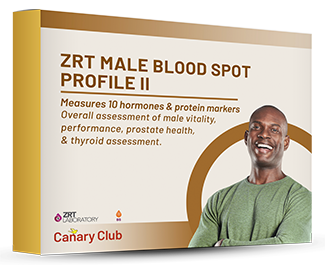Dear Hormones,
Where have you gone, and just when I need you the most?
Behind every earnest ambition, desire, and pursuit there is a hormone driving our passions. Hormones play as much of a role in a man’s interests as do his diet, sleep, and exercise. Our human drives are the result of hormones transforming energy into motivational pursuits.
With more recent science, we see that men have hormonal cycles just like women—with spikes and plunges even more drastic than those experienced during a menstrual cycle. For some men, these cycles can last for many years caused by an underlying hormonal imbalance.
Hormones Powerfully Influence Personality
Hormones drive the formation of our personality, having more to do with our ongoing development and thought process than most any other biological process—influencing our intentions in each and every stage of our life.
Dads, husbands, sons, boys, and grandads go through a hormonal shift every 7-10 years—at every age throughout life.
"Men Alive," writer, Jed Diamond, PhD., LCSW says: "Although most of us now accept that women and men have “male” and “female” hormones, it is more difficult to accept that men also have hormonal cycles".(1)
Being aware of these changes can provide a family with the tools to survive the roller-coaster rides.
The potential for early hormonal imbalance detection may help avoid lengthy depressions, chaotic behaviors, or a disoriented sense of self.
With this awareness, the family can remain cohesive during these hormonal changes and the aftermath. Our hormone levels change as we age and there is no need for dread when we are conscious, aware, and awake.
The Anguish of Male Hormonal Cycles
Some boys and men are not transitioning easily into successive stages of their development. The result is internal anguish, and external disharmony, in the family unit. Though a natural part of human development, each cycle can be traumatic and isolating.
Do you really know the male living in your house? Do women really know what it is like for a male to mature into a healthy man today?
Once a new stage of development has begun, personality changes do occur. You may recognize a new persona emerging during or after any one of these stages:
- puberty,
- early nesting,
- peak production, and
- 50+.
Puberty
Puberty, often around age 11-15, is the greatest development phase in our life. During this phase, males are pushed into a mold where they are either made or broken. Peers can pressure us to do more, teachers pressure us to think more, and grades and life choices pressure us to be more. Rarely is a male pressured into feeling more—more so to feel less.
Although puberty is a normal change in life, those with an underlying hormonal imbalance going into this phase can disrupt the natural process of personality development. When a low hormone level is combined with emotionally shut down feelings while going through puberty, the result can lead to a life-long tendency for depression, anxiety, antisocial behavior, and other related personality disorders.
Balanced hormones at puberty are critical for the development of healthy adulthood.
Early Nesters vs. Empty Nesters
Straight after puberty, many men have an urge to nest at around age 16-26. This tendency in men is generally overlooked in our culture believing it is an instinct only in young women.
Though the words “I want to nest with another” might not ever be said, the urge is expressed in his behavior.
During this time, young men experience their highest peaks in hormone levels. These hormonal cycles parallel the levels experienced by young women. These peaks in hormone levels have everything to do with influencing libido.
The social skills necessary for going into adult life are developed during this phase. Hormones help teenagers overcome social anxiety. When hormone levels don't hit the needed peaks, the individual is reluctant to socially engage.
After several years of social reluctance, the personality doesn't form nester instincts. We will see a rise in isolation, substance abuse, addictive behaviors around video games, over-eating, and TV binge-watching—avoiding the bonding with others needed to develop the healthy social skills needed throughout life.
Balanced hormones at the early nester phase of adolescence are critical to building human bonding and social skills needed for maturing into adulthood.
Peak Productivity Years
Between 27-42, men and women will peak in their productivity. The amount produced during this phase of our lives is staggering in comparison to our other phases. It seems as though we have an unlimited amount of energy, drive, and capacity. Hormones are fundamental to this phase.
For men who are lucky to have found their passion or the right career, these are the peak years devoting 100% of their energy to producing.
When they are living at their peak capacity already, where do they get the time and energy they need for family and friends? They borrow from their hormonal system.
He may be in a work environment that requires traveling, long hours, and intense mental focus. Each of these has a consequence on the hormones because they impact diet, daily routine, sleep, and exercise. This is a good time to test the hormones, in particular testosterone and SHBG.
Midlife Crisis
By the mid-'50s, most men have had a “midlife crisis.” This is something that can be shown in your hormones. Testosterone peaks and men often feel a sense of dissatisfaction from life, as the reproductive purpose of life begins to take a new turn.
Curious?
We might all be better off if we recognized that men, like women, have their own challenges dealing with hormones. The great philosophers tell us to "know thyself". Knowing and accepting our hormonal cycles may be the most important knowledge we can have about what it means to be a man. If you feel your changes in behavior are from hormones, why not take a test to find out?
Your Hormone Management Testing Plan
When you know you have done everything you can to manage your hormones—yet nothing has worked—it is time to consider testing.
- Step 1: Start by selecting the His Advanced Hormone Test Panel, or Male Profile II using the guide below.
- Step 2: Take the test to establish the starting hormone baseline at the onset of your plan. Consider developing your plan alongside:
- a licensed health care provider for medical conditions, especially for severe "out of normal range" results
- or a health care consultant for nutrition and supplements that will support your results
- Step 3: Develop a plan based on your hormone test results, establishing a one-year or more outlook.
- Be diligent in addressing the factors you can, such as work stress, poor diet, and lack of exercise.
- Keep logs of your intakes, and daily routines related to your hormone test results.
- Step 4: After 3-6 months of actively working on your plan, take the same test again to determine your progress.
Our ZRT Male Profile II can help you see where your hormones will be taking you.
(1) Jed Diamond, Men Alive, https://menalive.com/about-men-alive/
(2) https://labtestsonline.org/conditions/low-testosterone-adult-men



